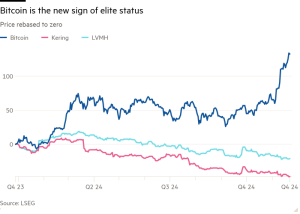Illness is flourishing in fiction once again
Unlock the Editor’s Digest for free
Roula Khalaf, Editor of the FT, selects her favourite stories in this weekly newsletter.
Health, and its absence, have sent writers to the page through the ages — from Jane Austen’s Sense and Sensibility to Mary Shelley’s pioneering plague novel, The Last Man and Hilary Mantel’s clinical memoir of endometriosis, Giving Up the Ghost. They brought to light the widespread dread of illness in their times, or as in Mantel’s case, frankly discussed what was once considered unmentionable.
This generation’s authors are once again obsessed with pandemics, sanatoriums, accidents, troubled minds, as their protagonists battle the new dragons of callous healthcare systems — illuminating the state of our times.
Recent examples include The Empusium by the Polish writer and Nobel laureate Olga Tokarczuk, who sets her latest novel in a European sanatorium, in a homage to Thomas Mann’s 1924 medical classic, The Magic Mountain. Meanwhile, American novelist and poet Garth Greenwell sends his poet protagonist in Small Rain into hospital wards and the tangle of a dysfunctional healthcare system. And, perhaps unsurprisingly, Covid has become a minor art form in its own right, inspiring an outbreak of “Vi-Fi”, virus-inspired fiction.
I usually duck books about illness — read too many, and you risk an irreversible case of Reader’s Hypochondria — but found myself turning to this flourishing genre for understanding, even comfort, after a family member’s medical crisis.
Among those that made it on to my reading pile was Nathan Hill’s Wellness in which the American novelist displays a subtle, superbly tragicomic approach, exploring the health of a marriage as well as the complex pulls of illness and placebo cures. Elizabeth and Jack meet as students in 1990s Chicago, strangers who can see into each other’s apartments. “He needs vegetables in his life,” Elizabeth thinks, assessing the emptiness of her future husband’s kitchen. Hill is acute about the modern hunger for wellness, the belief that a turmeric cleanse can magically wash away all troubles. “We don’t live in a world that offers a whole lot of care; we don’t feel listened to,” he said in a recent interview.
That strain of modern loneliness is further explored by writers like London-based Kate Weinberg whose new novel, There’s Nothing Wrong With Her, draws on her own experience of long Covid. Her protagonist, Vita, suffers from a mysterious, prolonged illness, relying on the support of friends, her partner, and a goldfish called Whoopi Goldberg. She reflects: “Something about the fact that you are stuck, that you can’t deliver the reassuring narrative of ‘getting better’ feels unnatural, disturbing.”
I read these books in hospital cafeterias and waiting rooms, cheered by the warmth of friends and by the hard-won compassion, even optimism, in these novels. There’s Nothing Wrong With Her is full of surprises — one of its characters is a 16th-century Italian poet, Luigi da Porto, whose work may have inspired Shakespeare’s Romeo and Juliet. Weinberg has said that it was only after she recovered and started writing again that she understood: those months of surrender to illness had also been a creative space.
For other writers, their novels and memoirs help them, and readers, come to grips with the realities of spiralling hospitalisation costs, overworked medical staff and the bewildering world of health insurance.
Danish writer Fine Gråbøl’s recent novel What Kingdom features an unnamed narrator who lives in a residential treatment centre in Copenhagen with four other young adults. Her narrator knows, even at a relatively young age, that: “The grammar of the ill is gendered, but also a matter of economics; the curable versus the chronic, benefit rates and supplementary payments, diagnoses and deductibles.”
Gråbøl writes for a younger generation steeped in worry and stress. By contrast Hanif Kureishi’s memoir, Shattered, speaks to older readers whose lives might be turned upside down by a chance illness or accident. In 2022, Kureishi, now 69, felt dizzy and collapsed when he was in Rome. It was serious, rendering him tetraplegic, but in an extraordinary feat of stubborn resistance, he began writing a newsletter with the help of his sons and his wife. “I am locked into the medical system, and each time I return to it, I am reminded of how alienated and anonymous it makes me feel, that I am a hostage of my body,” he writes in his most recent missive.
Kureishi calls himself one of the “lucky ones”, able to continue with his chosen profession, despite the many setbacks and obstacles (he uses a motorised wheelchair to get around). “This finished copy stands for what opportunities trauma may offer,” Kureishi says of Shattered. “Literature converts suffering into art.” For readers, these books are also a lifeline, bringing hope and empathy in the middle of the swirl of diagnoses, ICUs and the long trek across the terrain of sickness and health.
Join our online book group on Facebook at FT Books Café and subscribe to our podcast Life and Art wherever you listen
#Illness #flourishing #fiction




